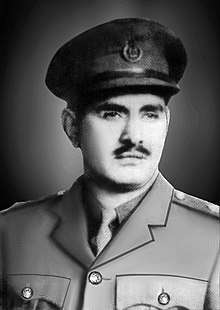1955 Poonch uprising
The Poonch revolt, also translated as the Poonch uprising, was a Civil revolt in Azad Kashmir against the State of Pakistan. The uprising broke out in 1955. It took 1 year until the uprising was suppressed in 1956.[1]

| Poonch revolt | |||||||
|---|---|---|---|---|---|---|---|
| Part of Kashmir Conflict | |||||||
| |||||||
| Belligerents | |||||||
| Sudhans Poonch district, Kashmir, Pakistan | Punjab Constabulary, Pakistan Army | ||||||
A major uprising occurred around the Rawalakot and Pallandri tehsils of Poonch (then a district, now a division), against the State of Pakistan; amongst displeased Sudhans, which Ibrahim claimed lasted for seventeen month. After the ‘bomb shell’ of Ibrahim's dismissal, ‘Colonel (Retired) Sher Ahmed Khan, a sardar and scion of the Sudhan tribe and the senior most military officer from Poonch, was made a cabinet minister with responsibility for defence, education and health. Colonel Sher Ahmed Khan tellingly resigned because ‘his community, the Sudhans, were strongly opposed to his appointment in view of the practical dismissal of their Chief, Sardar Ibrahim Khan, violent demonstrations had occurred particularly in the Rawalakot and Pallandri areas of Poonch, where Sudhans displeased with the sacking their ‘man’, Ibrahim, opposed the replacement government. There also had been show down between the Sudhans and the Pakistan Army contingents posted in the area’, which ‘caused great concern to the Central Government’. The Poonch situation became so bad that the Azad Kashmir Police could not control it. Members of the Punjab Constabulary of Pakistani Army were brought in. The Pakistan Army's 12th Division, with headquarters in Murree and with forces already deployed in Azad Kashmir, joined in the suppression, declaring martial law in Poonch. The fighting was not one sided. Some Sudhans had captured 120 soldiers of Punjab Constabulary, and their arms. Sudhan's anti government actions started in February 1955 with an assassination attempt in Poonch on the Azad Kashmir President, Sher Ahmed Khan, from which he had a ‘miraculous escape’. Matters escalated when police sought to arrest an ‘absconding accused’ by entering a mosque at Pallandri. There after, Sudhans clashed with the Pakistan Army, possibly soldiers from X Corps, and the Punjab Constabulary, which dealt with the insurrection brutally. Similarly, the Punjab Prosecuting Agency was ‘a terror’ to Azad Kashmiris, particularly those incarcerated. It took 1 year until the uprising was suppressed in 1956.[2]
Causes
A major cause of the rebellion was the demands of the local people for autonomy in administrative and budgetary affairs[1]
Military action
A resistance movement seeking a more democratic state of Azad Kashmir was active since September 1950. In 1951 a parallel government was formed in Poonch in retaliation to Pakistan's dismissal of Sardar Muhammad Ibrahim Khan as head of state.[1] The situation calmed down for some time because of Liaquat Ali Khan's assassination.
When Sardar Ibrahim protested and took the matter up, his government was dismissed. A revolt erupted in Rawalakot and Palandri in the Poonch district as a reaction to this action by the Pakistani State. A military contingent of 120 personnel led by Major Usman was sent in to crush the revolt and arrest its leaders. After an initial skirmish Ibrahim's forces were defeated and disarmed his tribe and under the guidance of Pakistan's then Minister of Kashmir Affairs, Mushtaq Ahmed Gurmani, and the arms were handed over to the government of Pakistan.[3]
General elections were held in 1952. Sher Ahmed Khan, a Sudhan from took office as the President of Azad Kashmir. Sardar Abdul Qayyum was also part of the cabinet. However, when after the passing of the Azad Kashmir Rules of Business in October, 1952, all executive power was vested in the Joint Secretary of the Ministry of Kashmir Affairs (Pakistan).[4] This resulted in the eruption of another armed rebellion in 1955 that was crushed by force by Pakistan Constubulary.
See also
- 1947 Poonch Rebellion
- Poonch district, Pakistan
- History of Poonch District
- Azad Kashmir
- History of Azad Kashmir
References
- Snedden, Christopher (2013). Kashmir: The Unwritten History. India: Harper Collins Publishers. ISBN 978-9350298978.
- Snedden, Christopher. Kashmir - The Untold Story. HarperCollins India. pp. 120, 121, 122. ISBN 9789350298985.
- Marxism, In Defence of. "Kashmir's Ordeal - Chapter Six". Retrieved 2016-09-25.
- Behera, Navnita Chadha (2007). Demystifying Kashmir. Brookings Institution Press. ISBN 978-0815708605.